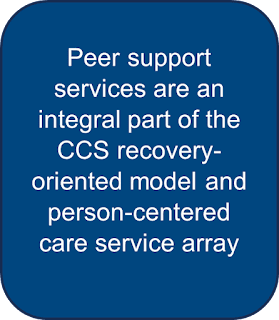Hey there! We're glad you've found us. Be sure to bookmark/save our new homepage: ATTCnetwork.org. That's where we'll be posting all our new content from now on!
Three Ways to Sustain Change with NIATx
By Mat Roosa, LCSW-R, NIATx Coach
The NIATx model is designed to help teams identify and implement a process improvement. While adopting a change is a significant accomplishment, the true test lies in maintaining that change and its positive outcomes over the long term: sustaining the change.
Sustainability refers to the
ability to stick with the new way of doing things and continue reaping the
benefits that prompted the change initially. It involves integrating the new
methods into the organizational culture, ensuring stability amidst future
changes, and fostering adaptability to unforeseen circumstances.
Despite its importance,
sustaining change is no easy feat. Many change efforts fail to be sustained
beyond the initial six months. To counter this trend, proactive planning and
diligent effort are essential. Sustainability planning should commence early in
the change project, aligning with the principles of continuous improvement.
Here's a trio of strategies that change teams can use to
guarantee lasting improvements:
1. Appoint a Sustain Leader familiar with the change and its rationale.
It is difficult to think about the future when you are in the midst of trying something new. One of the best ways to develop a change project with sustainment in mind is to assign a member of the change team to the role of sustain leader. This individual will support the key efforts to sustain the change, including developing policies and procedures and maintaining ongoing measurement, both discussed below. When the rest of the team turns their attention to new priorities, the sustain leader will keep the change effort on course.
2. Document the change in policy and procedure manuals, ensuring simplicity and clarity.
A clear
indication that a successful change is at risk of not being sustained is to
hear the Change Leader saying, “Don’t forget to continue to…”. Such reminders
are never needed for activities that are well-established as standard operating
procedures. Adjustments to documentation processes, including adding required
elements and checklists, make the new practice a required element that cannot
be skipped. Maintaining an up-to-date policies and procedures manual to actively
guide practice will ensure that the new practice becomes the norm.
3. Establish data collection methods to monitor progress continuously.
One of the
best ways to sustain a change is to keep measuring it. We tend to pay attention
to the things that we measure. When change projects achieve the desired goal,
there is a tendency to stop measuring and move on to new priorities. When
measurement is continued weekly, or at least monthly, the team can take
preventive action when the numbers start to slip.
This data monitoring can trigger
the reactivation of the change team. Ongoing measurement also points to the
need for manageable measures that are easy to maintain and review. Complex data
measures that require a high level of energy to maintain are less likely to be
sustained.
By embracing sustainability from the outset, organizations
can pave the way for enduring positive change and continuous improvement in
their operations.
Ready to launch a NIATx Change Project? Join
our next NIATx Virtual Change Leader Academy in May 2024!
ATTC's Pearls of Wisdom Podcast Series, Episode 4: The Next Decade (2023 and Beyond)
In celebration of the 30th anniversary of the Addiction Technology Transfer Center Network, we're taking stock of where we've been, and looking ahead to where we are going. We invite you to listen to our Pearls of Wisdom podcast series. Each episode examines a different decade in our network's history, and features conversations with the people who shaped and are shaping the field. In this series, hosts Laurie Krom and Maxine Henry of the ATTC Network Coordinating Office will talk with ATTC staff – past and present – about the history, challenges, and evolution of the network.
Featured guests include: Nancy Roget, Mountain Plains ATTC co-director; Denna Vandersloot, Northwest ATTC co-director; Pat Stilen, former director of the Mid-America ATTC; Lonnetta Albright, former director of the Great Lakes ATTC; Maureen Nichols, South Southwest ATTC director; Todd Molfenter, Great Lakes ATTC co-director; Andrew Wilson, Central East ATTC co-director; Estela Besosa-Martinez, project coordinator of the Northeast and Caribbean ATTC in Puerto Rico; and Abby Roach-Moore, technology transfer specialist with the Opioid Response Network.
In the fourth episode of our series, host and ATTC NCO co-director Maxine Henry talks with Andrew Wilson, Central East ATTC co-director, Estela Besosa-Martinez, project coordinator with the Northeast and Caribbean ATTC, and Abby Roach-Moore, technology transfer specialist with the Opioid Response Network (ORN), about what the next decade holds for the network and the field.
In the coming decade, Abby Roach-Moore said she expects to see harm reduction continue to be normalized as part of the continuum of care.
“Education is power, and that’s all harm reduction is,” she said. "You meet people where they are, but you're not going to leave them there."
Another area the panelists expect to see peer support specialists and people with lived experience making a significant impact and contribution to the work of the ATTC Network's mission.
“Peers are what was missing in this process of recovery,” Estela Besosa-Martinez said. "The clinician, or counselor, or social worker may possibly understand them, and have amazing tools to guide them... but the peer brings something that the clinician can't."
ATTC's Pearls of Wisdom Podcast Series, Episode 3: The Previous Decade (2013-2022)
In celebration of the 30th anniversary of the Addiction Technology Transfer Center Network, we're taking stock of where we've been, and looking ahead to where we are going. We invite you to listen to our Pearls of Wisdom podcast series. Each episode examines a different decade in our network's history, and features conversations with the people who shaped and are shaping the field. In this series, hosts Laurie Krom and Maxine Henry of the ATTC Network Coordinating Office will talk with ATTC staff – past and present – about the history, challenges, and evolution of the network.
Featured guests include: Nancy Roget, Mountain Plains ATTC co-director; Denna Vandersloot, Northwest ATTC co-director; Pat Stilen, former director of the Mid-America ATTC; Lonnetta Albright, former director of the Great Lakes ATTC; Maureen Nichols, South Southwest ATTC director; Todd Molfenter, Great Lakes ATTC co-director; Andrew Wilson, Central East ATTC co-director; Estela Besosa-Martinez, project coordinator of the Northeast and Caribbean ATTC in Puerto Rico; and Abby Roach-Moore, technology transfer specialist with the Opioid Response Network.
In the third episode of our series, host and ATTC NCO co-director Maxine Henry talks with Maureen Nichols, South Southwest ATTC director, and Todd Molfenter Great Lakes ATTC co-director, former executive director of the Great Lakes ATTC, about the growth and change of the network during its third decade.
Maureen Nichols joined the network in 2017, becoming director of the South Southwest ATTC in 2018.
She ne of the most significant challenges in the past decade has been the COVID-19 pandemic and its impact on the behavioral health workforce. One of the biggest changes has been the rapid rise in telehealth services. But an ongoing impact remains among the workforce.
“There are many fewer people available to provide services in behavioral health then there were at the beginning of this decade that we're talking about," she said. "And that still continues to be a huge challenge for the field. And the folks that are still doing the work are struggling to fill the positions.”
Todd Molfenter became the co-director of the Great Lakes ATTC in 2018. He said a significant focus for the ATTC network during the previous decade has been the evolving opioid crisis in the U.S.
“There’s been a lot of focus around (Medications for Opioid Use Disorder), getting buprenorphine, injectable naltrexone out more… and creating access around that,” he said. “As that improved, the evidence-based practices really began to evolve, the TTC network has been able to really contribute a lot to.”
Empowering Change with NIATx: Expanding Peer Support Services in Wisconsin’s Comprehensive Community Services Program
By Maureen Fitzgerald, Communications Manager, Great Lakes ATTC, MHTTC, and PTTC
Comprehensive Community Services (CCS) is a unique Wisconsin Department of Health Services (DHS) program designed to provide a wide range of community-based, recovery-oriented, and person-centered mental health and substance use disorder services to eligible individuals across the lifespan. The program, part of the DHS Division of Care and Treatment Services Bureau of Prevention Treatment and Recovery, works to help individuals with mental health and substance use challenges receive the care and support they need in their communities, rather than in institutional or residential settings.
CCS began in 2005 through an administrative rule and grew to include
half of the state’s counties. To increase the use of CCS statewide, Wisconsin
leadership changed the funding structure of the program and encouraged tribal
nations and counties to work in regional models. In 2014, under the leadership
of the BPTR Integrated Services Section Manager Kenya Bright, DHS started a
statewide expansion. CCS now operates in 70 of Wisconsin's 72 counties and
three tribal nations. CCS programs offer an array of 13 service components to over
15,000 individuals across the lifespan each year.
With this expansion winding down, CCS staff have shifted their
focus towards enhancing the program's quality and stability as one of DHS’ few
truly integrated behavioral health
programs.
“The Division of Care
and Treatment Services has a history of collaborating with NIATx on quality and process improvement
projects,” says CCS Coordinator Heather Carlson. “At the end of 2021, our Bureau
of Prevention Treatment and Recovery colleagues with the Coordinated Services Teams
(CST) Initiatives hosted a NIATx Change Leader Academy, which served as a nice
reminder of the NIATx process and how it could be applied to our psychosocial
services realm."
Heather is now
leading a NIATx initiative with her fellow CCS coordinators Mike Van Sistine
and Danielle Graham-Heine. Their goal is to increase the number
of CCS programs providing certified peer specialist services.
Peer support services are an integral part of the CCS
recovery-oriented model and person-centered care service array. They contribute
to the overall well-being and recovery of individuals with mental health and
substance use challenges by offering support, hope, and empowerment through
peer relationships and shared experiences.
The change team
Kenya Bright serves as the executive sponsor for the CCS
change team, with Heather and Mike serving as co-change leaders. Joining them
on the team are Danielle Graham-Heine,
BPTR peer coordinators Lynn Maday-Bigboy and Marguerit Galindo, and BPTR data
specialist Laura Gebhardt. The team meets monthly, while the change leaders
hold weekly meetings.
“We’ve also actively engaged other interested parties,
including peer recovery workgroups, to build support at different levels within
our division,” says Mike.
A system-level walk-through to define the big aim
Working with NIATx coach Scott Gatzke, the CCS change team recognized the need to adapt the NIATx walk-through exercise.
The 2022 survey showed that not all CCS programs were offering certified peer services, even in areas where state workforce data showed they were likely available. Thirty of the CCS certified programs did not use a certified peer specialist; of those, 27 appeared to have a certified peer specialist available in their county or tribe.
"This initial survey laid the groundwork for our change project," Mike explains. "To gain deeper insights into peer services, we decided to send out a focused survey to programs that do not presently provide peer services or that just began to offer them in 2022."
The team set a change project aim to
increase the number of CCS programs offering certified peer specialist services
in areas where those services appear to be available (based on 2022 workforce
development data) from a baseline of 42 programs to a goal of 52 programs by
December 31, 2024.
Change team strategy
"We've sent targeted surveys to 27 CCS programs that meet our change project's inclusion criteria: CCS programs that are not currently offering certified peer support services in areas where the services are available,” says Mike. “Our goal was to find out more about the specific hurdles they’re facing when it comes to offering certified peer specialist services.” Targeted surveys were also sent to six programs that began providing peer support services in 2022, to help gain insight into the factors that led them to provide these services.
The survey questions were designed to uncover whether the hurdles
were related to a lack of awareness about the availability of peer support
specialists, a misunderstanding of the potential roles these specialists can
play, or if there were other barriers preventing them from providing these
services.
“One-third of
respondents cited a lack of availability of peer support specialists in the
area, which doesn’t align with some of our existing data,” adds Heather. Other
reasons cited for not providing certified peer support services included a lack
of knowledge or awareness about peer support specialists, perceived lack of
need, challenges in sustaining peer services, and a lack of understanding about
the certified peer specialist role.
NIATx Principle #1 in Action
The change team has organized a series
of focus groups with CCS programs that completed the targeted surveys.
“Information from the focus groups will
further inform our discussions with our peer colleagues and CCS change team
members to help us craft the initial interventions for our upcoming pilot phase,”
adds Mike. “At the same time, we will also identify the 3-5 pilot programs
where we can test these interventions.”
“The change team has done a great job in adapting the NIATx
approach to a system level change goal,” says Scott Gatzke. “Their statewide
walk-through using survey data and the follow-up focus groups are a great
application of NIATx
principle 1, “Understand and involve the customer,” he adds. “The focus
groups also offer a unique opportunity to tap into customer insights on
solutions that will help meet the change project goal.”
New Framework Released to Reduce Opioid Overdose
By: HEAL Connections
The Opioid-Overdose Reduction Continuum of Care Approach (ORCCA): A Policymakers Guide to Implementing Evidence-Based Strategies that Address Opioid Overdose aims to help policymakers, communities and key stakeholders to develop comprehensive, multi-system strategies that address the opioid crisis. The science and evidence behind the framework was published in the Drug and Alcohol Dependence and outlines 19 essential evidence-based interventions to reduce opioid overdose deaths.
The 19 evidence-based interventions recommended in ORCCA across five domains include:
Prioritize Individuals at heightened risk for opioid overdose death:
To prevent overdose deaths, a primary focus should be on reaching populations with the highest risk, especially those who do not currently engage in treatment or prevention services. Recommendations include:
●
Prioritize delivery of services to those who need
them most in criminal legal settings and other venues
●
Implement field-based population detection methods
●
Use data sources to target intervention to those who
need services
● Engage individuals with lived experience in decision-making process
Opioid-Overdose Prevention and Naloxone Distribution
(OEND) programs encompass training on recognizing and responding
to overdoses, administering naloxone, and providing rescue kits.
Recommendations include:
●
Implement active overdose education and naloxone
distribution (OEND) programs for people who use opioids and their social
networks
●
Implement active OEND at venues where overdoses are
more likely to occur
●
Include passive OEND strategies
● Build OEND capacity among first responders
Enhance Delivery of Medications to Treat Opioid Use Disorder:
Improved access to
evidence-based Medications for Opioid Use Disorder (MOUD) significantly reduces
the risk of overdose death. These medications stabilize brain chemistry, reduce
opioid effects, and relieve cravings. Recommendations include:
●
Expand medications for opioid use disorder (MOUD)
capacity in healthcare, criminal legal settings, and through telemedicine
●
Initiate on-site MOUD in community-based settings
●
Create linkage programs and protocols
● Enhance MOUD engagement and retention
Remove Barriers to Critical Resources:
Improving outcomes and treatment
retention for individuals with OUD involves addressing the availability of
external resources that support recovery and enhance treatment retention.
Recommendations include:
●
Expand peer recovery support and peer services
●
Remove barriers to housing services
●
Expand transportation initiatives for patients with
opioid use disorder (OUD)
●
Address barriers to needed resources, including
insurance coverage, food security, childcare, and employment
● Remove barriers to supplemental behavioral health services
Safer Opioid Prescribing, Dispensing, and Disposal Practices:
These
strategies aim to reduce excess opioid supply, prevent access by vulnerable
individuals, and improve overall opioid prescribing safety. Recommendations
include:
●
Ensure safer opioid prescribing
● Implement safe and effective opioid disposal
The HEALing Communities Study, a multi-site research study, tested the impact of ORCCA, an integrated set of evidence-based practices across healthcare, behavioral health, justice, and other community-based settings. HEALing Communities is funded by the National Institutes of Health (NIH) Helping to End Addiction Long-term (HEAL) Initiative®. To download the ORCCA Guide for Policymakers, click here.
HEAL Connections
The HEAL Connections Center was created
by the NIH HEAL Initiative® to translate HEAL research into action. Learn more
here.
ATTC's Pearls of Wisdom Podcast Series, Episode 2: The Second Decade (2003-2012)
In celebration of the 30th anniversary of the Addiction Technology Transfer Center Network, we're taking stock of where we've been, and looking ahead to where we are going. We invite you to listen to our Pearls of Wisdom podcast series. Each episode examines a different decade in our network's history, and features conversations with the people who shaped and are shaping the field. In this series, hosts Laurie Krom and Maxine Henry of the ATTC Network Coordinating Office will talk with ATTC staff – past and present – about the history, challenges, and evolution of the network.
Featured
guests include: Nancy Roget, Mountain Plains ATTC co-director; Denna
Vandersloot, Northwest ATTC co-director; Pat Stilen, former director of the
Mid-America ATTC; Lonnetta Albright, former director of the Great Lakes ATTC;
Maureen Nichols, South Southwest ATTC director; Todd Molfenter, Great Lakes
ATTC co-director; Andrew Wilson, Central East ATTC co-director; Estela
Besosa-Martinez, project coordinator of the Northeast and Caribbean ATTC in
Puerto Rico; and Abby Roach-Moore, technology transfer specialist with the
Opioid Response Network.
In the second episode of our series, host and ATTC NCO
co-director Laurie Krom talks with Pat Stilen, former director of the
Mid-America ATTC, and Lonnetta Albright, former executive director of the Great
Lakes ATTC, about the growth of the network during its second decade.
Lonnetta Albright spent 17 years as executive director of the Great Lakes
ATTC, including the last five years as Principal Investigator. She is an executive
director of the John Maxwell Leadership Certified Team.
In reviewing the impact of the ATTC Network during that timeframe,
Albright emphasized the value of education and transformation provided by the
network, particularly from its seminal product, The Change Book: A Blueprint for
Technology Transfer.
“I think the greatest gift the ATTCs brought to the field, and continues
to, is to tell the truth and give facts,” she said. “And I’m not just talking
about evidence-based practices but helping people to think. So that Change Book…
helped us articulate what technology transfer is all about.”
Pat Stilen first became familiar with the ATTCs as a consumer, when she
was working for a managed care company, before becoming a consultant and then
joining the network full-time when it was still known as “The Addiction
Training Center.” She retired from Mid-America ATTC in March 2022.
For Stilen, one of the most significant contributions of the ATTC Network
during that time period was creating and developing core competencies to help
with professional development in treatment and recovery services.
“We were
still struggling with competencies as substance use counselors,” she said. “So
I really knew from a personal standpoint, having been a substance use counselor
myself and then trying to do training, that we really needed those competencies.
And that would not have happened without the ATTCs.”
ATTC's Pearls of Wisdom Podcast Series, Episode 1: The First Decade (1993-2003)
To celebrate the 30th anniversary of the Addiction Technology Transfer Center Network, we're taking stock of where we've been, and looking ahead to where we are going. We invite you to listen to our Pearls of Wisdom podcast series. Each episode examines a different decade in our network's history, and features conversations with the people who shaped and are shaping the field. In this series, hosts Laurie Krom and Maxine Henry of the ATTC Network Coordinating Office will talk with ATTC staff – past and present – about the history, challenges, and evolution of the network.
Featured guests include: Nancy Roget, Mountain Plains ATTC
co-director; Denna Vandersloot, Northwest ATTC co-director; Pat Stilen, former
director of the Mid-America ATTC; Lonnetta Albright, former director of the
Great Lakes ATTC; Maureen Nichols, South Southwest ATTC director; Todd
Molfenter, Great Lakes ATTC co-director; Andrew Wilson, Central East ATTC
co-director; Estela Besosa-Martinez, project coordinator of the Northeast and
Caribbean ATTC in Puerto Rico; and Abby Roach-Moore, technology transfer specialist
with the Opioid Response Network.
In the first episode of our series, host and ATTC NCO co-director Laurie Krom talks with Nancy Roget, Mountain Plains ATTC co-director, and Denna Vandersloot, Northwest ATTC co-director, about the birth of the ATTC Network. They also talk about the history, challenges and opportunities for growth and change, and the impact the network made in its first decade.
Nancy
Roget has been part of the network since its inception, first as an advisory board
member in 1993, and then as a staff member since 1994. In those early days, the
network was known as the Addiction Training Center (ATC). The extra “T” came
about as a way to signify the nascent network’s focus on disseminating evidence-informed
practices.
“Technology
transfer was included (in what the Network was doing,” she said.
Denna
Vandersloot says the ATTC at that time was instrumental in expanding the use of
evidence-based models in treatment and recovery settings.
“We
developed a training that was all about introducing people to the various
models, like the Matrix Model,” she said. “It really was that period of time in
the history of our field when we were really kind of moving into thinking about
the importance of evidence-based practices.
Charting New Frontiers: A Round-up of the NIATx in New Places Series
By Maureen Fitzgerald, Communications Manager, Great Lakes ATTC, MHTTC, and PTTC
In 2023, the NIATx in New Places series shared the stories
of how the NIATx process improvement model continues to shape transformation in
both familiar and uncharted territories. From clinical treatment to school
settings, prevention, criminal justice, and beyond, NIATx remains a tool for
change in the health and human service landscape.
NIATx coach and founding member Mat Roosa introduced the series with this post, highlighting the model's adaptability and enduring impact. Mat also shares his first walk-through experience and reflects on how NIATx has shared his career path.
March: Building Cultural Intelligence and Health Equity, Alfredo Cerrato, Senior Cultural and Workforce Development Officer, Great Lakes ATTC, MHTTC, and PTTCIn this post, Alfredo describes how the NIATx approach can help a team identify and remove access barriers for underserved communities. Integrating NIATx with the National Standards for Culturally and Linguistically Appropriate Services (CLAS) in Health and Health Care further enhances its effectiveness and offers a systematic approach to promoting equity in behavioral health services.
April 2023: Research and Innovation in Professional Coaching with NIATx, Dr. Jay Ford, UW–Madison School of PharmacyDr. Jay Ford is an associate professor at UW–Madison and a
member of the team that launched NIATx in 2023. His current research on
coaching, substance use treatment, HIV, and medication utilization in nursing
homes showcases the NIATx model's adaptability and effectiveness.
Sarah McMinn, LCSW, leads the Great Lakes MHTTC School-Based Mental Health Supplement and has used the NIATx model to address gaps in schools’ suicide prevention policies. In this post, she describes how the NIATx approach was adapted to school settings, offering a simple framework for educators to implement small, measurable changes efficiently.
June: Bringing the NIATx Change Leader Academy to HealtheKnowledge, Scott Gatzke & Maureen FitzgeraldScott Gatzke, Director of Dissemination for the Center for Health Enhancement Systems Studies and NIATx coach, helped to develop the NIATx Change Leader Academy (CLA) to meet the growing demand for NIATx training. Over the past two decades, NIATx CLAs have extended the model's reach to diverse areas nationwide. Continuing to adapt the CLA to meet changing needs, Scott describes a new project in development: an online version of the CLA that will be available on HealtheKnowledge.
July: The International Impact of the NIATx Model: Ukrainian healthcare providers increase access to treatment during war, Lynn Madden, PhD, MPA, and Kristina Spannbauer, Communications Specialist for Great Lakes ATTC, MHTTC, and PTTC,Dr. Lynn Madden reflects on the impact of NIATx since her
organization’s involvement in 2003 and shares the international success of a NIATx
project in Ukraine. Collaborative efforts to address opioid use disorders have
increased the number of patients receiving treatment in Ukraine significantly. Dr.
Madden’s journey with NIATx, from participating in the first demonstration
grant to global collaborations, emphasizes the transformative nature of NIATx
in improving healthcare access and outcomes.
Jessica Vechinski is the program manager for the
implementation arm of the Justice Community Opioid Innovation Network JCOIN, a research
project managed by the Center for Health Enhancement Systems Studies. Over
three years, 50 sites in 14 states participated in the study, using NIATx
coaching to improve the use of medications for opioid use disorder in jails.
The study found that NIATx coaching helped uncover and address barriers to
implementing MOUD in criminal justice settings.
In this Recovery Month 2023 post, recovery advocate Kris Kelly highlights the NIATx model’s potential for supporting recovery community organizations (RCOs). Emphasizing NIATx as a tool for empowerment, Kris notes that NIATx gets teams involved in a participatory process. She also envisions the potential impact for NIATx in continuous improvement in RCO initiatives.
October: Insights on Using NIATx in Prevention, Erin Ficker, Prevention Manager Great Lakes PTTC, and Maureen Fitzgerald, Communications Manager, Great Lakes ATTC, MHTTC, and PTTCErin Ficker, a prevention manager with 18 years of experience, teamed up with NIATx coach Scott Gatzke to conduct NIATx Change Leader Academies (CLAs) for prevention professionals. In this post, she describes how they adapted NIATx principles to resonate with the prevention audience, emphasizing customer/participant involvement and reframing prevention work as processes. Erin highlights the PDSA Cycle, one of the essential NIATx tools, as an effective strategy for making gradual improvements in prevention efforts.
November: Recruitment, Hiring, Retention, and Promotion (RHRP), Mat Roosa, LCSWIn this post, Mat describes how the critical need to address
understaffing and low worker retention inspired new application of the NIATx
tools to understand and improve each aspect of the workforce process:
recruitment, hiring, retention, and promotion. This focused, data-driven
approach aims to make a meaningful impact on behavioral health workforce
challenges.
NIATx founder David H. Gustafson reflects on the enduring impact of the NIATx model, emphasizing its simplicity, focus on key aims, and the power of storytelling. Key factors in NIATx staying power include support from organizations such as the Robert Wood Johnson Foundation and SAMHSA, ongoing research, and the NIATx Change Leader Academy. Dave also talks about using NIATx in his current research and in exploring the role of technology, including AI, in addiction treatment.
Enduring innovation
The stories shared in the NIATx in New Places Series
underscore not only the adaptability and enduring impact of the NIATx model,
but also the commitment of individuals across various fields to drive positive
change. As we embark on the new year, these stories remind us that with the
right tools and a shared vision, we can continue to shape and improve the human
service landscape.
Here’s to the resilience, innovation, and team spirit that
define the NIATx journey!
















